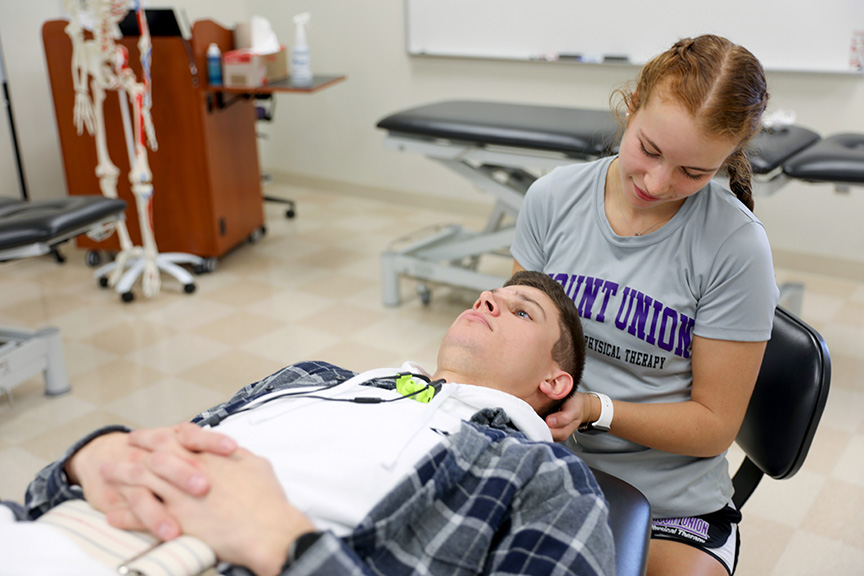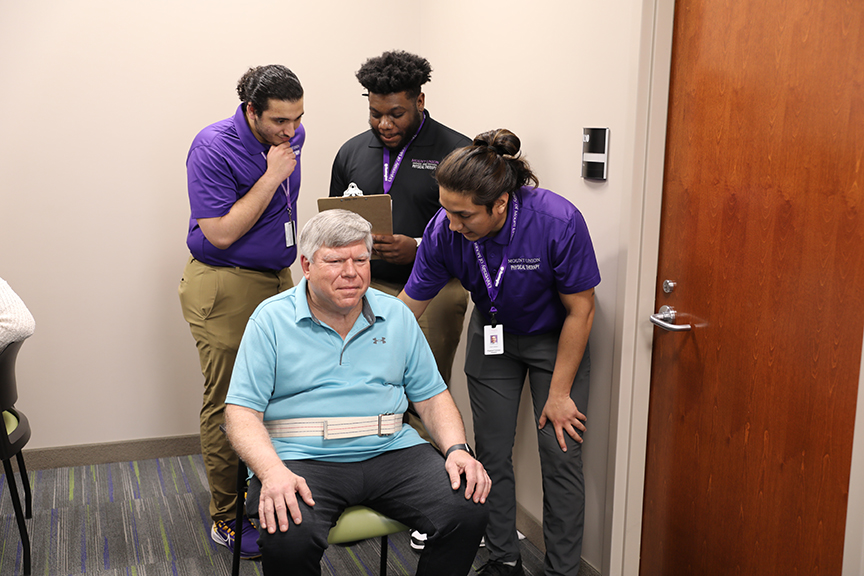Understanding DPT Credentials
If you're considering a career in physical therapy, understanding what a DPT entails is crucial. We’ll walk you through what it takes to earn a Doctor of Physical Therapy degree, how long the programs typically last, the types of courses you'll take, and why this career path can be so rewarding. Learn more about Mount Union's DPT degree admission requirements.
There are plenty of benefits to pursuing a DPT. It’s the highest level of education in the field, which opens doors to more job opportunities and potentially higher salaries. These programs will train you to provide top-notch, evidence-based care so you’ll be well-prepared to diagnose and treat a wide range of musculoskeletal, neurological, and cardiopulmonary conditions.
What to Expect from a DPT Degree Program
 Considering a Doctor of Physical Therapy program? Here's what to expect, including curriculum, clinical experiences, licensing and certification requirements, and available resources for DPT students.
Considering a Doctor of Physical Therapy program? Here's what to expect, including curriculum, clinical experiences, licensing and certification requirements, and available resources for DPT students.
To become a licensed physical therapist in the U.S., you’ll need to earn a DPT degree from an institution accredited by the Commission on Accreditation in Physical Therapy Education (CAPTE). Most DPT degrees take around three years of full-time study, combining classroom learning, lab work, and hands-on clinical experience. Coursework covers anatomy, physiology, kinesiology, therapeutic exercise, and biomechanics. Students also learn examination techniques, medical screening, and evidence-based practice. Clinical rotations allow students to apply their knowledge in real-world settings under the guidance of experienced physical therapists. See Mount Union's DPT degree curriculum.
Hands-On Learning: Clinical Education in DPT Programs
Clinical education is a vital part of a Doctor of Physical Therapy (DPT) program and offers students hands-on experience in a variety of healthcare settings. DPT students practice under the supervision of licensed physical therapists, applying their classroom knowledge to real-world scenarios. During clinical rotations, DPT students will have the opportunity to gain experience in a variety of environments. These settings can include outpatient clinics, hospitals, rehabilitation centers, skilled nursing facilities, and home health care services. Students work with diverse patient populations, such as individuals recovering from surgery, those managing chronic conditions, and patients with neurological or musculoskeletal disorders. This exposure helps students refine their skills in patient assessment, treatment planning, and therapeutic interventions while also fostering professional communication, ethical decision-making, and interprofessional collaboration.
DPT Licensing Requirements and Career Support Resources
After completing a DPT degree, aspiring physical therapists must meet licensing and certification requirements. These requirements vary by state but generally include passing the National Physical Therapy Examination (NPTE) and obtaining a state license. Some states may require additional exams or background checks. Learn more about the NPTE and other outcomes for Mount Union DPT degree program students.
Several professional organizations and resources support DPT students. The American Physical Therapy Association (APTA) offers valuable resources, networking opportunities, and continuing education. Specialty sections within the APTA focus on specific physical therapy areas like orthopedics, pediatrics, and sports. Other resources include journals, online forums, and conferences to stay updated with the latest research and advancements.
University of Mount Union's DPT Degree
LEARN MORE REQUEST INFORMATION APPLY NOW
Career Opportunities and Salary Expectations with a DPT Degree
 A physical therapy career offers opportunities for those with a Doctor of Physical Therapy degree.
A physical therapy career offers opportunities for those with a Doctor of Physical Therapy degree. As the demand for physical therapy continues to grow—thanks to an aging population, advancements in medical care, and a greater emphasis on health and wellness—DPTs are more in demand than ever.
As the demand for physical therapy continues to grow—thanks to an aging population, advancements in medical care, and a greater emphasis on health and wellness—DPTs are more in demand than ever.
The job outlook for physical therapists is impressive. With a projected growth rate of 14% from 2023 to 2033, far above the average for most other fields, this means strong job prospects and competitive salaries. In fact, according to the Bureau of Labor Statistics, the median salary for physical therapists in 2023 was $99,710, with the top 10% making over $130,870.
Physical therapy offers plenty of room for growth, in addition to great job security. DPTs can specialize in sports, pediatrics, geriatrics, or orthopedics. With experience and further education, many physical therapists become clinic directors and department managers or even open their own practices. If you're passionate about helping others, enjoy a dynamic work environment, and want a career where you can make a real difference, earning a DPT degree can be the key to unlocking an exciting future in physical therapy.




 Considering a Doctor of Physical Therapy program? Here's what to expect, including curriculum, clinical experiences, licensing and certification requirements, and available resources for DPT students.
Considering a Doctor of Physical Therapy program? Here's what to expect, including curriculum, clinical experiences, licensing and certification requirements, and available resources for DPT students. A physical therapy career offers opportunities for those with a Doctor of Physical Therapy degree.
A physical therapy career offers opportunities for those with a Doctor of Physical Therapy degree.